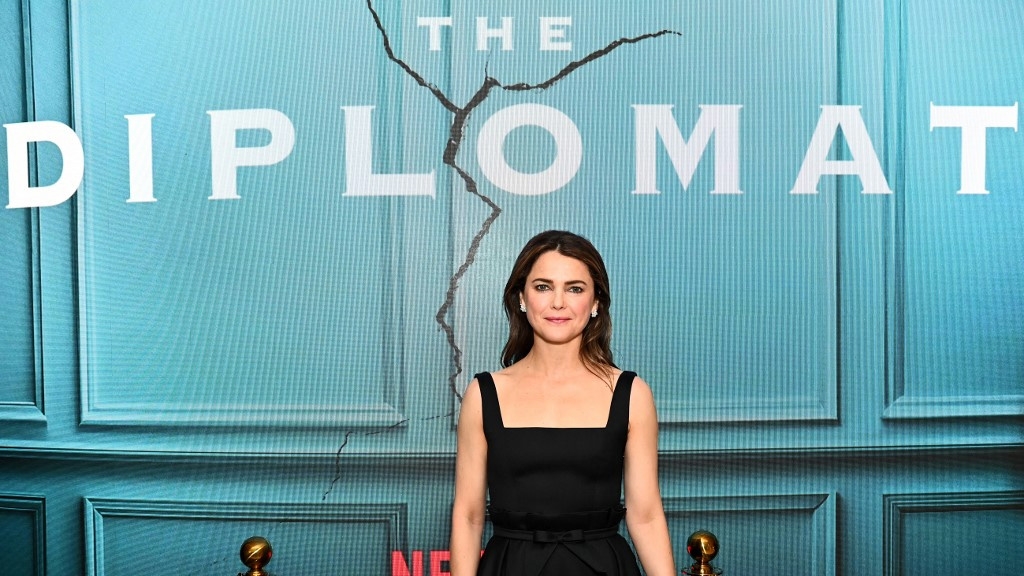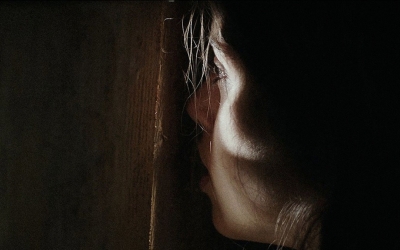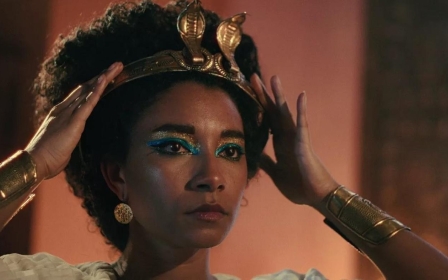Netflix's The Diplomat: American foreign policy as a dysfunctional marriage

There is a way of watching the highly popular TV series The Diplomat - an American political thriller created by Debora Cahn - that is most certainly not the way its producers intended it to be seen. (Warning: spoiler alert)
They seem to think they have created a delightful romantic comedy, mixed with some real-life political drama rooted in “the Middle East”. They are not entirely wrong in that assumption. But we need to scratch that surface a bit.
Premiered on Netflix in April and renewed for a second season shortly thereafter, The Diplomat features an American diplomatic couple - Kate Wyler (portrayed by Keri Russell) and her husband Hal Wyler (Rufus Sewell) - on the verge of divorce, when an attack on a British warship in the Gulf coincides with a political scandal at the White House that leads to Kate being considered for a vice presidential position. The couple’s relationship throughout the show remains loving, caring, even romantic - but all in a, well, diplomatic way.
That premise moves into a very exciting, and at times superb, television plot, if only we could brush aside some very nasty traces of American military adventurism in the region, which is the subject of the selfsame plot.
An excellent review of the series by Mike Hale for the New York Times tells you all you need to know about the political and marital dynamics of the show - except, of course, for the main three subtexts of the plot, which must be placed upfront if the series is to be of any interest to anyone outside the US-UK market.
New MEE newsletter: Jerusalem Dispatch
Sign up to get the latest insights and analysis on Israel-Palestine, alongside Turkey Unpacked and other MEE newsletters
Hale’s prose is a prime example of how reviews of fictional takes on the US “war on terror” in Muslim countries - a terrorising war on mostly innocent people - have happily joined the scripts, pushing into near-oblivion matters of fragile life and gruesome death, which have now metamorphosed into fodder for prime-time entertainment for Americans and Europeans.
The three subplots of the show involve Iran, Afghanistan and Iraq, the latter two of which are pushed into the faded background. What instead drives the show is the loving, though troubled, relationship between the Wylers; the incident involving the British warship that places Iran in the crosshairs of a UK-US military strike; and the eventual revelation that Russia might have been behind it all. This is plenty to sustain the drama for the eight episodes of the show’s first season.
Pushed into the background
The plot draws our attention to Kate navigating with verve and panache, mixed with an endearing lack of confidence, between the US president (Michael McKean) and the British prime minister (Rory Kinnear) to prevent a rash military response against Iran when the facts are still not clear.
It turns out that she and her husband have a backdoor connection to the deputy foreign minister of Iran, who assures them his country is not behind the attack. To show their goodwill, the Iranians tell Hal that they have called off a planned assassination of a retired US general in retaliation for the killing of General Qassem Soleimani.
You really should tip your hat to any show that can bring former US President Donald Trump’s assassination of Soleimani into a romantic comedy plot. Chapeau!
What the script pushes into the deep background is the fact that Kate had served in Baghdad, Beirut and Islamabad as a hands-on American diplomat. Before her reassignment as US ambassador to the UK, she was on her way to Afghanistan after the US withdrawal, and she still feels guilt over the Afghan native informers and collaborators left behind.
We have no clue what happened to those native informers left behind at the mercy of the Taliban's vengeance. Even deeper into oblivion is cast the fate of Iraq
In an encounter with Iran’s ambassador to the UK, we can hear Kate try to mumble a few Persian words, displaying the extent of her knowledge of “the locals”.
As Iraq and Afghanistan are pushed into the barely evident background, the story opts to explore Kate’s sexual attraction to UK Foreign Secretary Austin Dennison (David Gyasi), while her husband is also briefly distracted by the foreign secretary’s available sister, Cecilia Dennison (T’Nia Miller). What drives the show well is the parallel stories between the dysfunctional marriage of the Wylers and the dysfunctional diplomatic dance between the US and UK, and between them and the rest of the world.
As the troubled white couple and their respective dalliances with two Black British siblings simmers blissfully apace, the plot moves to focus on a Russian mercenary army that might have been behind the attack on the British warship - done in a way to implicate Iran.
The marriage is collapsing, as are the special relations between the US and UK, while Kate and her husband try to finagle a way for things not to get out of hand. The Iranian presence in the geopolitics of the region is alive and kicking, receiving more airtime as the wrongly accused perpetrator of an attack on a British warship.
The first season of the show ends abruptly, with the cliffhanger that a much more sinister plot might have been cooked up at 10 Downing Street.
Soft-power tool
As we watch the show, if we were to bring the three suppressed subplots forward and put the romantic comedy on pause, it would inadvertently turn into a commentary on US and UK foreign policies, portraying them as a dysfunctional marriage with the rest of the world.
Except for a powwow in the penultimate episode of the first season between Kate and one of her colleagues from her time in Afghanistan, we have no clue what happened to those native informers left behind at the mercy of the Taliban’s vengeance. Even deeper into oblivion is cast the fate of Iraq, where Kate also served.
At its best, the dysfunctional marriage at the centre of the show becomes a metaphor for the US and its foreign policies in the region. At its worst, the show exemplifies how - after two decades of the terror of US militarism under successive administrations, both Republican and Democrat - the fate of millions of Afghans has become a background prop for a romantic comedy to tickle the political fancies of American and British audiences.
One cannot fault these audiences for entertaining themselves with a workable fusion of romantic comedy and political thriller, which keeps Netflix in lucrative business as its writers and actors go on strike. With much more limited means, Afghans, Iranians and Iraqis have their own cinema and other forms of artistic expression to tell their sides of these terrorising stories to anyone willing to listen and watch. But venues like Netflix have a far more global audience.
At their roots, such shows are the soft-power ideological normalisers of an immoral and destructive US and UK militarism, wherein the diplomatic side of the show seeks in vain to make super-intelligent heroes out of morally flawed, politically inept, intellectually ill-equipped and dysfunctional agents and operators of global disorder.
As you watch the show and are drawn into the collective virtuoso performance of all its cast and crew, you suddenly pull back from the screen and catch yourself implicated in romantically whitewashing the terror that the US, UK and their imperial adventurism have perpetrated on the world.
So, yes, it is a good show, and you should watch it; but as you do, try to tease out those parts of the plot that are deeply repressed and don’t make it to the screen.
The views expressed in this article belong to the author and do not necessarily reflect the editorial policy of Middle East Eye.
This article is available in French on Middle East Eye French edition.
Middle East Eye delivers independent and unrivalled coverage and analysis of the Middle East, North Africa and beyond. To learn more about republishing this content and the associated fees, please fill out this form. More about MEE can be found here.






